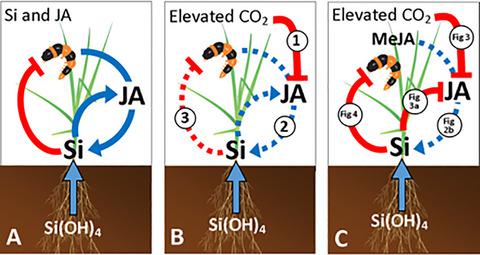当前位置:
X-MOL 学术
›
Funct. Ecol.
›
论文详情
Our official English website, www.x-mol.net, welcomes your
feedback! (Note: you will need to create a separate account there.)
Elevated atmospheric CO2 suppresses jasmonate and silicon‐based defences without affecting herbivores
Functional Ecology ( IF 4.6 ) Pub Date : 2020-03-21 , DOI: 10.1111/1365-2435.13549 Casey R. Hall 1 , Meena Mikhael 2 , Susan E. Hartley 3 , Scott N. Johnson 1
中文翻译:

大气中二氧化碳含量的升高会抑制茉莉和硅基防御,而不会影响草食动物
更新日期:2020-03-21
Functional Ecology ( IF 4.6 ) Pub Date : 2020-03-21 , DOI: 10.1111/1365-2435.13549 Casey R. Hall 1 , Meena Mikhael 2 , Susan E. Hartley 3 , Scott N. Johnson 1
Affiliation

|
- Elevated atmospheric CO2 (eCO2) not only increases plant growth but can also interfere with defence against insect herbivory through the disruption of the jasmonic acid (JA) pathway. Silicon (Si) plays an important role in plant stress tolerance and resistance to herbivory, particularly in grasses, many of which accumulate high amounts of Si. Activation of the JA pathway has been reported to stimulate Si uptake, while Si supplementation can alter both constitutive and induced phytohormone levels. A reduction in JA concentration under eCO2 has the potential to reduce Si uptake in plants.
- Using both Si supplemented (Si+) and control (Si−) plants (Brachypodium distachyon) grown under ambient (400 ppm) and elevated (640 ppm) CO2 concentrations, we tested how plant growth, foliar Si concentration and endogenous JA responded to methyl jasmonate (MeJA) application and the subsequent effects on insect herbivore performance (Helicoverpa armigera).
- Elevated CO2 reduced Si concentration by 19% and endogenous JA by 70% on average. MeJA significantly increased Si concentration in Si+ plants. Si+ plants had higher baseline JA levels compared to Si− plants under control conditions (i.e. no stress), however, when plants were chemically induced with MeJA, the JA response was on average 84% lower in Si+ plants compared to Si− plants. Plants without MeJA treatment showed the opposite response, that is, Si+ plants had higher baseline JA levels compared to Si− plants. Si significantly reduced herbivore consumption and growth rate. Despite eCO2 significantly reducing both Si and endogenous JA, no effect was seen on herbivores feeding on eCO2 plants.
- Collectively our results suggest that Si alters the JA response of plants. We show that JA induces Si uptake, however, Si then reduces the JA response of plants under induced stress conditions. However, predicted increases in CO2 levels within this century may significantly reduce Si‐based mechanical defences against herbivory via a reduction of endogenous JA.
中文翻译:

大气中二氧化碳含量的升高会抑制茉莉和硅基防御,而不会影响草食动物
- 升高的大气CO 2(eCO 2)不仅可以促进植物生长,而且还可以通过破坏茉莉酸(JA)途径干扰对草食性昆虫的防御。硅(Si)在植物的抗逆性和对草食动物的抵抗力中起着重要作用,尤其是在草中,其中许多草中积累了大量的Si。据报道,JA途径的激活可刺激硅的吸收,而硅的添加可以改变组成型和诱导型植物激素水平。在eCO 2下降低JA浓度有可能减少植物对Si的吸收。
- 使用在环境(400 ppm)和升高(640 ppm)CO 2浓度下生长的补充Si(Si +)和对照(Si-)植物(Brachypodium distachyon),我们测试了植物生长,叶片Si浓度和内源JA对甲基的反应茉莉酸酯(MeJA)的应用及其对昆虫食草动物性能的后续影响(Helicoverpa armigera)。
- 升高的CO 2平均降低了19%的Si浓度和70%的内源性JA。MeJA显着提高了Si +植物中的Si浓度。在控制条件下(即无胁迫),Si +植物的基线JA水平高于Si-植物,但是,当用MeJA化学诱导植物时,Si +植物的JA响应平均比Si-植物低84%。未经MeJA处理的植物显示出相反的响应,即与Si-植物相比,Si +植物具有更高的基线JA水平。硅显着降低了草食动物的消费和生长速度。尽管eCO 2显着降低了Si和内源JA,但对以eCO 2植物为食的草食动物未见效果。
- 总的来说,我们的结果表明Si改变了植物的JA响应。我们表明JA诱导了Si的吸收,但是Si会降低诱导胁迫条件下植物的JA反应。但是,预计本世纪内CO 2含量的增加可能会通过减少内源性JA来显着降低Si对食草动物的机械防御能力。











































 京公网安备 11010802027423号
京公网安备 11010802027423号